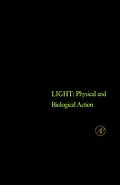Light: Physical and Biological Action provides an introduction to the significant problems that are usually considered in photobiology. This book covers a variety of topics, including photosensitization, phototropism, phototaxis, photosynthesis, bioluminescence, diurnal rhythms, and the measurement of molecular excitation by light.
Organized into five chapters, this book begins with an overview of the characteristics of light from a purely physical and historical viewpoint. This text then discusses the various types of radiation, including temperature or thermal radiation, photoluminescence, chemiluminescence, radiation produced by electric discharges, and radiation produced by high local electric field. Other chapters consider the various bond involved in molecular formation, which shows the atomic orbitals associated with the constituents of the molecule. This book discusses as well the fluorescence bands of polyatomic molecules. The final chapter deals with some of the limitations of the methods involved in electron microscopy.
This book is a valuable resource for biologists and photochemists.
Inhalt
Foreword
Preface
Chapter 1 · Measurement and Characterization of Light
1. The Nature of Light
2. Photometry
2.1. True, Color, and Brightness Temperature
2.2. Standards of Luminous Intensity and Luminous Flux
2.3. Energy of Visible Light
2.4. Difficulties Inherent in Photometric Units in Biology
3. Light Sources
3.1. Energy Distributions and Intensities
3.2. Achievement of "Monochromatic" Light
3.3. Measurement of Light Intensities
4. The Light from the Sun-Some Biological Implications
Chapter 2 · Excitation of Molecules by Light
1. Basic Photoprocesses in Atoms and Simple Molecules
1.1. Historical Background of the Nomenclature of Spectral Terms
1.2. Spectral Terms and Electron Orbitals
2. Fates of Excited Molecules
2.1. Chemical Reactivity of the Excited State
2.2. Fluorescence, Phosphorescence, and Quenching
2.3. Energy Transfer
3. Photochemical Reactions
3.1. Photoreactions in the Vapor Phase
3.2. Solution Photochemistry
3.3. Charge Transfer Complexes
3.4. Mechanism of Photographic Action
3.5. Photochromism and Photoisomerism
Chapter 3 · Chemiluminescence-Reactions and Mechanisms
1. Gas Phase Reactions
2. Condensed Phase Reactions
2.1. Phosphorus
2.2. Luminol
2.3. Lophine, Pyrogallol, and Lucigenin
2.4. Oxysilicone
2.5. Photosensitized Chemiluminescence
2.6. Riboflavin
2.7. Luciferin
2.8. Hydrogen Peroxide
Chapter 4 · Bioluminescence-Enzyme-Catalyzed Chemiluminescence
1. Firefly Reactions and Mechanism
1.1. Utilization of Oxygen
1.2. Comparison of Various Fireflies
2. Bacterial Reactions and Mechanism
3. General Properties of Other Systems
4. Evolutionary Aspects of Bioluminescence
Chapter 5 · Biological Action of Light
1. Organization and Structure of Light Receptor Systems
2. Photosynthesis
2.1. A Summary Scheme for Photosynthesis
3. Photoperiodism and Photomorphogenesis: The Control of Metabolism by Light
4. Phototropism and Phototaxis
5. Direct Stimulation by Light
6. Vision
6.1. Units and Sensitivity of the Eye to Light
6.2. Structural Features
6.3. The Haidinger Brush Phenomenon
6.4. Biochemistry of Vision
6.5. Color Vision
7. Deleterious Effects
7.1. Bactericidal Action of UV Light
7.2. Photodynamic Action
8. Photoreactivation
9. Optical Asymmetry in Biological Systems
Appendix I
Physical Constants
Appendix II
Conversion Factors
Appendix III
Lasers
Appendix IV
Filter Data for Isolation or Absorption
Appendix V
Thermopile Method for Determination of Light Intensities
1. Use of Quartz Window Thermopiles
2. Vacuum Thermopiles
3. General Techniques
Appendix VI
Ferrioxalate Chemical Actinometer for Determination of Light Intensities
Appendix VII
Assay of Adenosine Triphosphate Using Firefly Luminescence
References
Author Index
Subject Index
